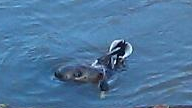The Angling Trust is demanding urgent action to remove a seal which has taken up residence in Bewdley on the River Severn, some 75 miles from its natural home in the sea, and has been eating its way through large numbers of the local coarse fish population.
Bewdley is a very important stretch of river for fishing in the UK, and contains a number of large barbel, pike and chub, among other species. The seal has been observed eating large numbers of these fish every day for several months and it is now endangering the future of angling in the town, which is an important source of income for local shops and businesses. The mammal has also been spotted eating ducks and large pike, which are normally safe from any predators on the river.
 Although the seal has been in the river since October 2012, Angling’s representative body the Angling Trust was only notified of its presence shortly before Christmas. Most seals that come into rivers do not stay for long, and return to the sea in a few days. However this creature has taken a liking to the area, possibly because members of the public have apparently been feeding it.
Although the seal has been in the river since October 2012, Angling’s representative body the Angling Trust was only notified of its presence shortly before Christmas. Most seals that come into rivers do not stay for long, and return to the sea in a few days. However this creature has taken a liking to the area, possibly because members of the public have apparently been feeding it.
The Angling Trust has written to the Environment Agency urging them to take action to remove the seal both to protect local fish stocks from unsustainable predation and to protect the seal itself. The creature can be lawfully shot on receipt of a licence from Natural England but anglers would rather it was returned safely to the sea where it belongs. Sadly, this request has been declined by the Environment Agency despite their statutory duty to ‘maintain, develop and improve’ fisheries in England and Wales and the fact that they have helped with the removal of seals in the past.
The Angling Trust has also contacted the Marine Divers Marine Live Rescue (MDMLR) organisation, who would have been willing to help, but from their experience of trying to capture seals in rivers said that it would be impossible to capture the animal safely in the fast flow of the River Severn.
On the recommendation of the MDMLR the Trust has now placed an order with Aquatec, a company in Scotland which provides seal scarers – known as scrammers – which emit a high-pitched noise that deters seals from fish farms. Although they only have a range of 50 metres, it is thought that they might be deployed on a boat and used to drive the seal downstream. Unfortunately the lead time for an order is as much as four weeks and there is no guarantee that this tactic will work.
As a last resort to protect fish stocks the Angling Trust has been forced, on behalf of its member clubs, to contact Natural England to secure a licence to shoot the seal using a qualified marksman if no other solution can be found. Although this option will clearly be highly unpopular with the crowds of people who have come down to watch the seal, it may be the only course of action available to save the fishery from being irreparably damaged by this predator which has got stuck above several locks and weirs.
Seal populations are extremely healthy around the UK coastline and numbers have grown rapidly in recent years. They are regularly killed in Scotland under licence to protect salmon and sea trout stocks in estuaries.
Angling Trust chief executive Mark Lloyd said:
“We think that the Environment Agency or Natural England should have taken action before now to protect vulnerable fish stocks in the River Severn, but as they have not, we have responded to anglers’ concerns by investing our members’ donations and subscriptions to find a number of potential solutions to this very difficult issue. This marine predator cannot be allowed to carry on eating its way through freshwater fish that have taken decades to grow to a size which can draw anglers from all over the country to fish for them.”
He described the grim choice faced by the authorities:
“If no action is taken in the next month, long lasting damage will be done to one of the country’s most treasured river fisheries which will be a major set-back to the local economy and the enjoyment of thousands of anglers. This animal belongs in the sea and its presence so far inland is not natural. Its path back to sea has been blocked by man-made weirs and it may have been tempted to stay by people feeding it titbits. We will try everything possible to remove it humanely, but more drastic action may be the only option if these methods do not work.”








